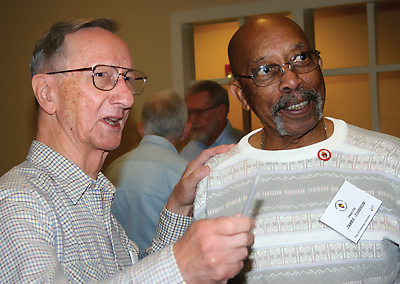
 COLUMBIA — Approaching difficult health care decisions from a Catholic perspective was the focus at the Diaconate Fall Day of Continuing Education held Oct. 17 at St. Peter Church in Columbia.
COLUMBIA — Approaching difficult health care decisions from a Catholic perspective was the focus at the Diaconate Fall Day of Continuing Education held Oct. 17 at St. Peter Church in Columbia.
Father John Markham, M.D., was the keynote speaker. The priest is the bishop’s health care liaison in the Diocese of Savannah, Ga., and is the Catholic chaplain for Memorial Health University Medical Center and two other medical facilities in Savannah.
Father Markham, who is twice widowed and a father of two children, practiced gastroenterology for 26 years before beginning studies for the priesthood.
His major focus during both morning and afternoon workshops was how to address end-of-life issues while staying true to Catholic values. Father Markham discussed how these decisions can and should be made, the importance of designating a health care power of attorney, and how to prepare advance directives.
He is a member of the ethics board at three health care facilities, and said end-of-life decisions are some of the most difficult that the groups face. He said the board is often asked to make recommendations about care when a patient can’t speak for themselves and does not have a designated representative to make tough decisions. An example is whether or not to begin drastic treatments that might not help a dying person in the long run.
He said people need to be educated about their rights and options because many times seriously ill patients and their families deal with doctors they don’t know, and many doctors aren’t good at communicating with families, especially when news is bad.
“Many people who have long-term relationships with doctors are handed off to someone else when they’re in the hospital, and this can cause the family a lot of confusion,” he said. “People are like deer in the headlights.”
He said one positive trend is that ethics courses are now required beginning in the first year of medical school, and hopefully future generations of doctors will have better training to help patients and their families make difficult decisions.
For now, he said, it is important for Catholics, and everyone, to learn about end-of-life issues and make sure they have a directive prepared that reflects their values and beliefs.
Father Markham said the Catholic pro-life ethic requires hospitals and medical professionals to always provide care, comfort and basic needs, but does not require an individual, for instance, to carry on indefinitely with medical treatments, like dialysis, if they do not want them.
He said it is also important to help people try to find meaning in the difficulties they face near death.
“Healing is always possible even when a cure is not. The real agony for people can come when they try to determine: What does this mean? Can I find meaning in what I am going through?” he said.
“Even people who are dying can find meaning in suffering,” he said. “It’s about being part of the ongoing redemptive work of Jesus Christ.”
After the morning sessions, Father Markham concelebrated Mass with Msgr. Joseph R. Roth, director of the Office of the Diaconate. Msgr. Roth said the deacons provide indispensable services in their home parishes and at missions around the state.
“Thank you for being deacons,” he said. “It’s so very important. Thank God for being called to the diaconate, and thank God that he’s given this gift to you. Many deacons in this diocese are doing outstanding work, and they are making impressions on people. Many people are impressed by the reverence of our deacons.”
He encouraged the men to constantly study the Scriptures and realize the importance of being a witness to the Gospel message in everything they do.
“We’re doing this for almighty God,” Msgr. Roth said. “We need to understand the beauty of the word of God and how that fits with what we’re doing both in church and out of church. The word of God needs to come alive in what we do, especially in the liturgy. Do the work you have to do so the word of God comes across beautifully!”
Deacon Albert Shito of St. Anthony Mission in Hardeeville said Father Markham’s workshops would help him address the needs of people dealing with health problems.
“From the counseling aspect, this day has been a lot of help,” he said. “Health care is a big concern these days, and it helps to be able to shed some light on these difficult issues.”
Deacon Walt Hollis, from St. Gregory the Great in Bluffton, said the day was a special chance to share worship and fellowship with his fellow deacons.
“This is a day to reflect, to get away from the blocking and tackling we do every other day of the week in our work at the church,” he said. “We get a chance to reflect on our faith, and have time for prayer together.”
